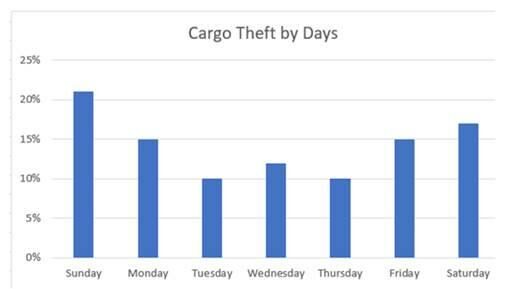

Cargo theft has been prevalent globally for ages, from pirate attacks on merchant vessels at sea, to the plundering of horse-driven wagons by robbers, to the more sophisticated attacks on modern vehicles. The intent and execution have remained the same over the years: intercept and steal goods from the vehicle while on-route to the destination. However, prevalent across all other modes of transport, cargo theft on the road comprises a sizeable amount and demands attention. Modern cargo theft uses advanced technologies such as frequency jammers and EMP interferences to obstruct existing security measures.
A study done by the Supply Chain Risk Industry Partnership says approximately $20-30 billion worth of goods are stolen globally every year, with most incidents occurring on ground transportation and ships. Cargo theft is generally downplayed because the usual consensus is that the insurance provider covers the loss. Also, upon cargo theft reporting, the insurance provider's premium generally increases. For this reason, some thefts are left unreported, and the statistics may not reflect the reality or gravity of the situation.

The study further shows the decreasing number of cargo thefts from 2014 to 2018 (See Exhibit 1). The research also indicates that each theft's average value has reduced by close to 50% in the last five years. However, this picture is not inclusive, as important data related to unreported cases is missing. Analysis of the reported incidents yields a few patterns and potentially an opportunity to mitigate the risk of theft. Cargo theft is most prominent during certain days of the year, months, or weeks, and certain kinds of goods attract more theft attempts than others. In the US, California, Texas, Florida, Illinois, and Georgia recorded the highest cargo theft rates compared to others.

The study also delves into cargo theft trends to show that it is common during specific periods. For instance, Tuesdays and Thursdays are relatively safer to move shipments. (See exhibit 2) Similarly, prominent holidays in the US, like Labor Day, Thanksgiving, Christmas, and the Fourth of July, witness an increased number of cargo theft instances. The trend shows that the latter half of the year experiences more cargo thefts than the rest of the year. Additionally, weekends are when cargo is left unattended and is ideal for thieves to take due advantage. Data from Sensitech states that there is a spike of 50% of cargo theft cases if freight trucks are left unattended for longer durations. The holiday season also sees a hike in the e-commerce shipment movement, contributing to increased cargo theft cases.

The nature of the goods also plays a part in the disappearance of cargo across the world. The most popular goods on the list belong to the miscellaneous category, followed by food and drinks, home and garden, and electronics, while apparel, auto parts, building, and industrial parts are the least stolen goods. (See Exhibit 3). Electronic goods attract more cargo theft instances than others as there is a great demand for the latest technology. Additionally, these goods have high resale value and are easier to distribute into consumer networks illegally. Food and beverage thefts are also quite common. However, the commodity value is comparatively lesser; load values lost are not large enough to trigger panic, and tracking these items is quite challenging due to weak tracking IDs.
Holiday thefts: Most thefts happen over the weekends and holidays as the cargo remains unguarded in trailers at the yards, warehouses, and ports.
Cyberattacks: Despite the protective measures, modern cargo thieves have access to superior technology and real-time information about the cargo's movement and location. Thieves may orchestrate cyber-attacks to access shipment documentation to create fake documents for pickups with illegal carriers that steal the load.
Internal assistance: Instances of cargo theft from trailers parked in yards require elaborate planning and resources. The perpetrators may have insider information about the actual cargo status, which allows them to identify the loopholes in the system and exploit them. Lack of housekeeping and ignorance to safeguard the cargo might sometimes leave an easy opening for cargo theft.
Avoiding cargo thefts can range from implementing some best practices to upgrading IT infrastructure.
SAP S/4 HANA, Transportation Management (SAP TM) solutions are designed for transportation and logistics requirements across industries to reduce transportation costs and enhance logistics efficiency. SAP TM enables organizations to manage all inbound and outbound domestic and international freight in the same environment and provides traceability and visibility of orders, shipments, items, and logistics processes. Some of the potential opportunities in SAP TM to handle cargo theft-related issues are:
Cargo theft is an existing menace in the supply chain industry with significant financial and business implications. It also hampers the timely delivery of goods and affects the customer experience. With sophisticated cargo theft attacks, it is crucial to increase safety using both process and technology solutions. Shipment visibility solutions, advanced technology that prevent theft of databases, and identifying falsified documents for pickup are the potential solutions. SAP's future IoT and Blockchain solutions and slight modifications to the TM module are also promising options. However, all these proposals are suggestive, and with further research and observations, more solutions can emerge to mitigate cargo theft risks.
Implementation partners like ArchLynk with extensive TM implementations can help companies identify these business requirements and design solutions effectively. ArchLynk, with more than 50 successful global SAP TM on-premise implementations, is a leading consulting firm in SAP TM. Our consultants are well-equipped to advise clients about the various aspects of cargo theft and are already working to understand local challenges, mitigate the risk of cargo theft, and help achieve safer shipment movement. Contact us to learn how we can help your organization protect against cargo theft.